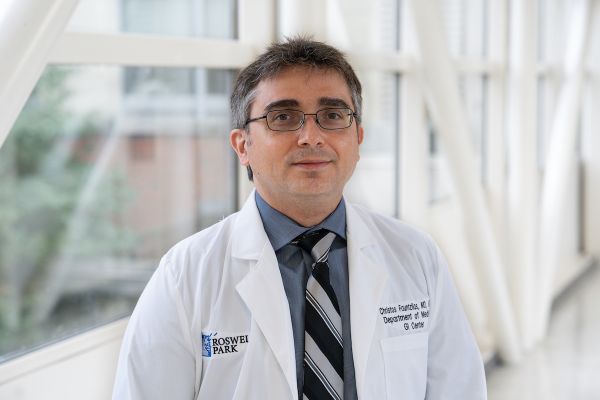A recent study by Roswell Park doctors of the most common type of esophageal cancer — squamous cell carcinoma — sheds light on what drives its persistent growth and offers hope that treatment will improve for patients with the disease.
Former surgical oncologist Steven Hochwald, MD, MBA, says esophageal cancers can be difficult to treat, because they grow rapidly and have multiple genetic mutations, so newer, less-toxic therapies have been ineffective.
“As a result, patients with esophageal squamous cell carcinoma typically do not have a very good prognosis,” says Dr. Hochwald, who is Chief of Gastrointestinal Surgery and Vice Chair of the Department of Surgical Oncology.
Hochwald and several of his Roswell Park colleagues began looking for what causes this form of esophageal cancer to grow. They found that, independent of growth factors in many cancers, glucose — an important energy source found in many foods — drives the growth of esophageal squamous cell carcinoma. They also found that this cancer can, in fact, grow in the presence of glucose alone.
Hochwald says the team’s finding that glucose spurs the growth of cancer cells is worrisome, because glucose is a part of everyone’s diet. Earlier studies also suggested that glucose drives cell growth in other squamous cell cancers, including lung cancer.
The Roswell Park team is looking at small-molecule drugs that might block the ability of glucose to encourage tumor growth. And the team plans to select and test the effectiveness of compounds with high efficacy and limited toxicity for treating patients with esophageal cancer.
“It will take some time, but we're hopeful that over the next couple of years we're going to make progress in finding new drugs that will improve the survival of patients with this type of cancer,” Hochwald said. “Our findings are early, but they really speak to the fact that we have to look at metabolism in the cancer cells and that understanding how glucose is metabolized — and why cancer cells break down glucose at a very high rate — is very important.”
In the meantime, Hochwald recommends that patients exercise to decrease body fat, which has been linked to an increased risk of developing many types of cancer, including esophageal cancer.
“We have to be really careful about health and diet and exercise, and keeping lean,” he says. “If glucose can drive cancer growth, then patients with esophageal cancer probably have to be careful about their diet, their glucose intake, and make sure they're speaking to their medical professionals to get advice.”
Hochwald notes that Roswell Park patients are fortunate to have access to a team of dietitians who can advise them about healthy eating habits and provide enhanced recovery after therapy for esophageal cancer and other malignancies.
Growth factors are naturally occurring substances — often proteins or steroid hormones — that stimulate cell growth. They regulate a variety of cellular processes, including cell multiplication. Some types of cancer are associated with rapid cell growth, while others cause slower growth. External signals aren’t required for cancer cells to divide and multiply; cancer cells are able to grow without these signals, as is the case with esophageal squamous cell carcinoma.
Glucose is a simple sugar that is an important energy source for humans and animals. It is found primarily in foods rich in carbohydrates — pasta, potatoes, bread, rice, vegetables, fruits, yogurt and milk — but also in proteins (fish, peanut butter, meat) and fats (butter, olive oil, salad dressings). As our digestion breaks down food, it releases glucose, which enters our bloodstream or is stored for later use.


